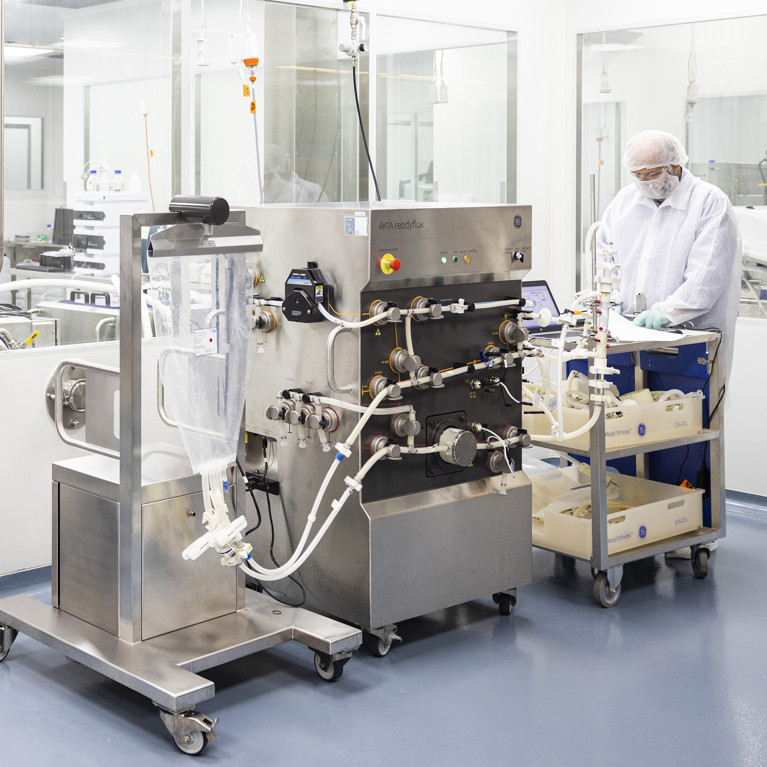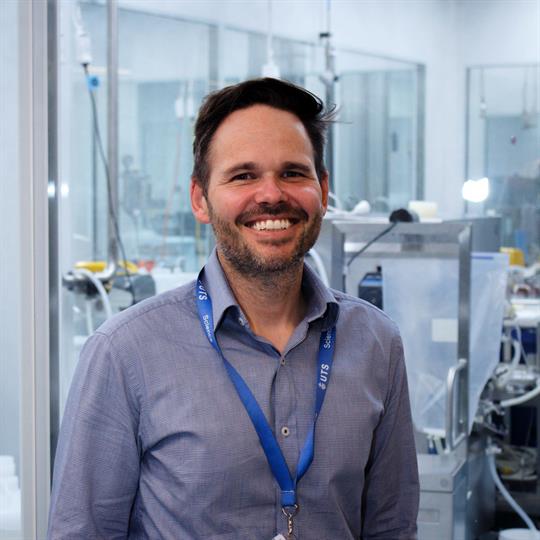- Posted on 4 Jun 2025
- 8 minutes read
UTS is creating a pipeline of homegrown next-generation vaccines for Australia.
Research at a glance
- UTS plays a vital role in vaccine research and manufacturing in Australia, developing them for hard-to-treat diseases
- mRNA vaccines are faster, adaptable, and easier to produce, revolutionising bacterial disease prevention and personalised medicine
- The Australian Institute for Microbiology and Infection and Biologics Innovation Facility are creating an in-house pathway to take new mRNA vaccines from the lab all the way to large-scale production
- UTS’s industry and government partnerships are driving biotech innovation and expanding sovereign manufacturing capabilities, reducing Australia’s reliance on overseas resources
UTS is pioneering mRNA vaccine research and innovation, tackling antimicrobial resistance and other major health challenges.
By bringing vaccine design, development, and manufacturing together, UTS – alongside industry and government partners – is positioning Australia as a leader in vaccine innovation.
During the COVID-19 pandemic, mRNA (messenger RNA) vaccines became a breakthrough technology. While researchers had worked on mRNA vaccines for decades, the urgency of the pandemic and increased investment helped overcome previous challenges, leading to the rapid development of vaccines, like those from Pfizer and Moderna.
It also fuelled more research and development into mRNA vaccines to tackle other diseases that have been notoriously hard to vaccinate against – especially bacterial diseases.
A faster, smarter way to prevent disease
Unlike other vaccines, which use weakened or inactivated pathogens, mRNA delivers genetic instructions that teach our cells to produce a target protein that would normally be produced by a pathogen or cancer cell.
The immune system recognises this protein, builds antibodies, and remembers how to fight the real infection. Once the instructions are delivered, the mRNA molecules rapidly degrade within hours.

Such biodegradable mRNA vaccines offer a faster, more adaptable way to prevent and treat disease. While traditional vaccines take years to develop, mRNA vaccines can be designed and tested within months.
They are easier to modify, can target multiple pathogens or proteins in a single vaccine, and use synthetic production rather than live bacteria or viruses, making them highly scalable and easier to manufacture.
They offer exciting new ways to target bacterial diseases and have huge potential for personalised medicine, treating cancer, rare diseases, and chronic conditions with precise, patient-specific therapies.
From discovery to manufacturing, under one roof
At UTS, the Australian Institute for Microbiology and Infection (AIMI) is pioneering mRNA vaccines to combat antimicrobial resistance.
“We’re developing vaccines against molecules we couldn’t target before,” said AIMI Director, Professor Garry Myers.
“Instead of just treating infections, we’re preventing bacteria from colonising in the first place.”
Current projects include:
- vaccines for urinary tract infections (UTIs), which affect 150 million people globally each year
- middle ear infections, which could prevent chronic cases in children
- livestock diseases, where antibiotic overuse is a major concern.
It’s a very exciting time – there’s a huge amount of potential. We’re not just developing vaccines; we’re creating an entire ecosystem for RNA innovation.

Vaccines developed by AIMI are manufactured in the Biologics Innovation Facility (BIF) at UTS, a state-of-the-art facility that replicates the Good Manufacturing Practice (GMP) environment found in industry.
As a national leader in biomanufacturing and GMP training, the BIF enables the scale-up and large-scale production of vaccines, helping to close critical gaps in Australia’s sovereign RNA vaccine capability.
“The team at AIMI can design mRNA vaccines and bring the most promising candidates to BIF, where we bridge the gap between lab-scale manufacturing and full-scale industry production,” said Associate Professor Andrew Care, Director of the BIF.
“Our facility is a unique stepping stone, enabling Australian researchers and businesses to cost-effectively manufacture vaccines at scale before advancing to commercial GMP production at facilities, like the upcoming NSW RNA Manufacturing Facility operated by Aurora Biosynthetics.”
The BIF is nationally recognised for its hands-on GMP training programs, which equips trainees with industry-relevant skills essential for the large-scale manufacture of RNA-based products.

New opportunities and partnerships driving vaccine innovation
UTS’s collaborative approach moves mRNA vaccine research beyond the lab, accelerating vaccine development and commercialisation.
Key recent achievements include:
-
A $1.8 million grant secured to develop an mRNA vaccine targeting urinary tract infections (UTIs), in collaboration with partners including CSIRO and UNSW
-
$1.4 million awarded to develop nanovaccines to prevent, or delay, the onset of Alzheimer’s disease
-
$1.4 million investment to establish the Vaccine & RNA Design Centre (VRDC) at AIMI, in partnership with UNSW, ANU, CSIRO, and the NSW Department of Primary Industries
-
Expansion of Australia’s RNA manufacturing capabilities through the BIF, supporting mRNA vaccine production and GMP workforce development
Based at AIMI in Sydney’s Tech Central precinct, the VRDC will help to fill a major gap in NSW’s RNA research and development capabilities.
The centre will develop cloud-based tools to design new mRNA vaccines and RNA treatments for humans and animals, creating valuable intellectual property and opening doors for new businesses, commercial partnerships, and joint ventures.
By building strong partnerships between industry, government, and academia, UTS is helping to create a thriving, long-term biotechnology industry in NSW.
“It’s a very exciting time – there’s a huge amount of potential,” said Professor Myers.
“We’re not just developing vaccines – we’re creating an entire ecosystem for RNA innovation.”
Research team
- UTS AIMI: Professor Garry Myers, Associate Professor Iain Duggin
- UTS BIF: Associate Professor Andrew Care, Sushil Gupta
- VRDC partners: ANU, CSIRO, NSW Department of Primary Industries, Office of the NSW Chief Scientist & Engineer, UNSW
- UTI vaccine partners: ANU, Australian Centre for Genomic Epidemiological Microbiology, Biointelect, CSIRO, Australian Government’s Medical Research Future Fund, NSW Health, Starpharma
- Alzheimers vaccine partners: Macquarie University, National Health and Medical Research Council, University of Adelaide








